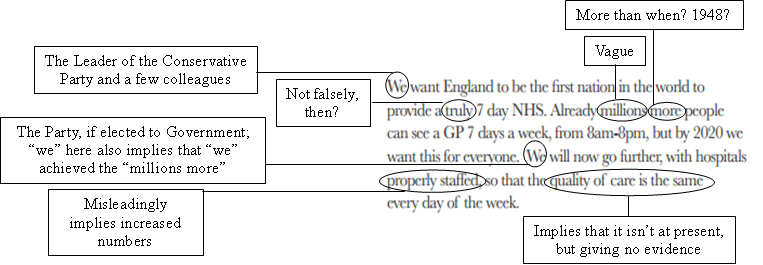 I recently heard Jeremy Hunt, UK health secretary, on the Today programme claiming that the Government has a mandate for the controversial contract that it wants junior hospital doctors to sign. I can’t find that mentioned in the Conservative Party’s 2015 manifesto.
I recently heard Jeremy Hunt, UK health secretary, on the Today programme claiming that the Government has a mandate for the controversial contract that it wants junior hospital doctors to sign. I can’t find that mentioned in the Conservative Party’s 2015 manifesto.
The Indo-European root MAN meant a hand. The Latin word was manus, from which we get words directly and by adding suffixes: maintain, manacle, manage, manège, manicure, manipulate, manner, manoeuvre, mansuetude, manual, manufacture, [manu]factory, manumit, manuscript. Manqué is from the Latin mancus, having a useless hand. To emancipate is to take someone by the hand (Latin capere, to take). An amanuensis (short for servus a manu plus the suffix -ensis, belonging to) writes things out by hand at another’s dictation, as Tolstoy’s wife, Sofya Andreevna, did for him and Eric Fenby for Frederick Delius. The manubrium sterni is like a handle, comparing the body of the sternum (Greek στέρνον the chest) to the blade of a sword, and the xiphoid process (ξίϕος a sword) to its tip.
From the Indo-European root DŌ we get the Latin verb to give, whose paradigm runs do, dare, dedi, datum. Put MAN and DŌ together and you get mandare, to give by hand, as you would a writ or an order of mandamus, and hence to order or command. The Maundy money that the Queen gives out reflects the “new commandment” (mandatum novum) in John 13:34 “that you love one another”. Other words ending in -mand or -mend imply an order: commend and recommend, countermand, demand, remand. The word mandate entered English in the 16th century and originally meant “a contract by which one person authorizes another to act without payment on his or her behalf, either generally or in a particular capacity” (OED). It implied an element of trust, although presumably it would been marked by a legally binding written document. In Roman times “mandatum” also meant an imperial directive, and during the French Revolution the Jacobins introduced what they called mandats impératifs, following a principle enunciated by Jean-Jacques Rousseau in Du contrat social ou Principes du droit politique (1762). Mandats représentatifs were in opposition to mandats impératifs and allowed an individual to represent a wider constituency, a method that is thought to have been introduced first in the English Parliament in the 16th century. The translation “mandate instructions” was then shortened to “mandate”, which came to mean “the commission to rule or to pursue stated policies conferred by electors on their elected representatives; support for a policy or measure of an elected party regarded as deriving from the preferences expressed by the votes of the electorate” (OED). A doctor’s mandate, a term introduced during the financial crisis in 1931, is “a mandate given by an electorate authorizing a government to take whatever measures are necessary to deal with some extreme or critical situation”—an emergency operation.
Add Latin manus to [in]festus, hostile or troublesome, and you get manifestus, caught in the act, red-handed, and therefore obvious, manifest. As Dryden wrote in Absalom and Achitophel, “Now, manifest of Crimes, contriv’d long since, He stood a bold Defiance with his Prince”. A manifest thus became a piece of evidence, such as the list of a ship’s cargo or any inventory, and a manifesto then became evidence of intention, “a printed declaration, explanation, or justification of policy issued by a head of state, government, or political party or candidate.” It would be good to see a political manifesto that actually contained evidence, instead of just weasel words and vague platitudinous promises. A manifesto is also “a book or other work by a private individual supporting a cause,” like my 2010 manifesto for UK clinical pharmacology and Atul Gawande’s Checklist Manifesto.
The relevant text about the NHS in the body of the 2015 Conservative Party’s manifesto is reproduced below, with annotations based on the observations about weasel words that I made in last week’s blog. There’s no mention of a contract. Nor is a contract mentioned in a recent written statement promising “to help create the safest, highest quality health and care services 7 days a week, including improved early diagnosis, services and outcomes for cancer patients”. No mandate then. Later in the manifesto the following statement appears: “We are deeply proud of our NHS staff”. I haven’t found any evidence of that either.
Jeffrey Aronson is a clinical pharmacologist, working in the Centre for Evidence Based Medicine in Oxford’s Nuffield Department of Primary Care Health Sciences. He is also president emeritus of the British Pharmacological Society.
Competing interests: None declared.

